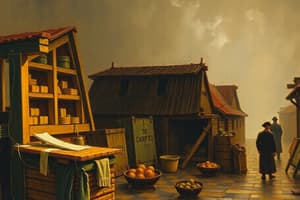Podcast
Questions and Answers
What is the primary reason businesses exist within an economy?
What is the primary reason businesses exist within an economy?
- To promote competition among workers.
- To satisfy consumer needs and wants. (correct)
- To generate government revenue.
- To control the distribution of wealth.
Which of the following is NOT a basic feature of an economic system?
Which of the following is NOT a basic feature of an economic system?
- Trading negotiations with other nations.
- Political system governance. (correct)
- Methods of resource allocation.
- Production and consumption patterns.
How does scarcity affect economic systems?
How does scarcity affect economic systems?
- It ensures that all resources are utilized efficiently.
- It forces societies to decide how to allocate limited resources. (correct)
- It decreases the overall satisfaction of consumers.
- It eliminates the need for opportunity cost.
What role do markets and prices play in the U.S. economy?
What role do markets and prices play in the U.S. economy?
Opportunity cost is best defined as:
Opportunity cost is best defined as:
What is a key feature of a traditional economic system?
What is a key feature of a traditional economic system?
Which factor of production is primarily concerned with human effort and skill?
Which factor of production is primarily concerned with human effort and skill?
In a market economy, what primarily determines the prices of goods and services?
In a market economy, what primarily determines the prices of goods and services?
Which of the following best describes opportunity cost?
Which of the following best describes opportunity cost?
Flashcards are hidden until you start studying
Study Notes
c
Studying That Suits You
Use AI to generate personalized quizzes and flashcards to suit your learning preferences.




